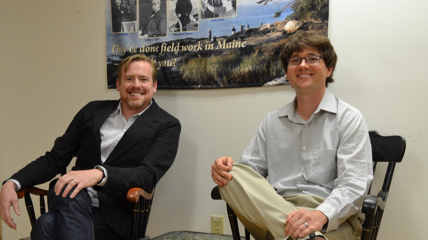
Kevin Du Clos successfully defends Ph.D. thesis
On Thursday, December 1, Kevin Du Clos successfully defended his Ph.D. thesis at the University of Maine’s Darling Marine Center (DMC) in Walpole. The defense not only earned Du Clos a Ph.D. in Oceanography from the School of Marine Sciences, but it was also the conclusion of a long and productive research career at the DMC for Du Clos, who has been at the lab since 2009.
Dr. Pete Jumars, professor emeritus in the School of Marine Sciences, served as Du Clos’s advisor, along with co-advisor Dr. Damian Brady, who said that during his time at the DMC, Du Clos had published scientific papers that had been cited 82 times.
“He’s particularly good at developing techniques with new technology that lets you figure out old questions in a new way,” said Brady, an assistant professor based at the Darling Center.
That was true for Du Clos’s thesis research, which took a closer look at the feeding rates of a well-known species, soft-shell clams. Clams eat by using two syphons. One syphon pumps in food and water, while the other pumps out waste. In his research Du Clos used a technique called particle image velocimetry to measure the rate at which water is pulled into the inhalant siphon and then created a mathematical model to accurately and reliably quantify that flow of water.
“Flows can be important for the larger ecosystem,” said Du Clos. For example, suspension feeders like clams can help control an overabundance of nutrients in the water, which can be harmful to the environment and other marine species.
For Du Clos, who earned his undergraduate degree at the University of California, San Diego, the successful defense also marks the start of a new chapter. He is leaving Maine to go to the University of South Florida to work with Dr. Brad Gemmell, whose lab also focuses on Du Clos’s area of study—the biomechanics of marine organisms.
Located at 193 Clarks Cove Road in Walpole, the University of Maine’s Darling Marine Center is an active center of marine research, education, and community engagement. We study coastal and marine ecosystems, as well as the human communities that are a part of them, in Maine and around the world. For more information about the DMC please visit our website dmc.umaine.edu.
